

5 Features of Google Advanced Search That Students Should Know How to Use. School libraries and teacher-librarians: evidence of their contribution to student literacy and learning. Dr Hilary Hughes is Senior Lecturer in the Master of Education (Teacher-Librarianship) program at QUT, an active member of QUT’s Children and Youth Research Centre and a previous Fulbright scholar-in-residence at University of Colorado Denver.
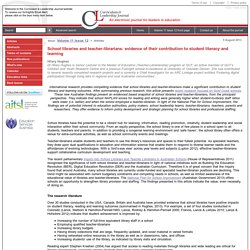
She has contributed to several recently completed research projects and is currently a Chief Investigator for an ARC Linkage project entitled ‘Fostering digital participation through living labs in regional and rural Australian communities’. International research provides compelling evidence that school libraries and teacher-librarians make a significant contribution to student literacy and learning outcomes. After summarising previous research, this article presents recent research focused on Gold Coast schools. These new Australian findings present an evidenced based snapshot of school libraries and teacher-librarians, from the principals’ perspective.
The research literature. APA 6 & 7 Comparison Tables - APA Style. This artist makes portraits that age as you move around them - Insider. Home Design Artist makes portraits that age as you move around them Maggie Cai and Kyle Desiderio Sergi Cadenas creates oil paintings that change into different images as you move from one side to another.He adds this element to his art pieces by painting an image on each side of vertical strips.Doing this allows him to hide two completely different images in one piece.Visit Insider.com for more stories.
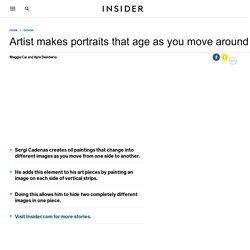
Most Popular Most Recent Videos. ENG 10 media literacy competences. It's not 'fair' and it won't work: an argument against the ACCC's news media bargaining code. Google and Facebook have threatened to limit or remove news services for Australian users, in response to the Australian Competition and Consumer Commission’s draft news media bargaining code.
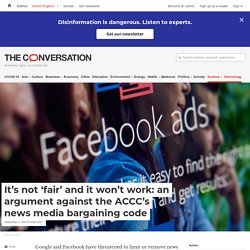
This week, Facebook announced should the code become law, the company would stop letting publishers and users share local and international news on its Australian Facebook and Instagram sites. Google has also made implicit threats to limit its Australian news services – potentially by removing Google News in Australia, as it did in Spain in 2014. Arguments in favour of the code centre on two points. First, that Australian media outlets are in critical danger of going bust because of Google and Facebook’s dominance of the digital advertising market.
Second, that Google and Facebook are Godzilla-like entities dominating the market and resisting any regulation attempt – especially one that could set an international precedent. Misunderstanding how news works on social media Assessing the value of news. The Economist Educational Foundation. Inbox (25) - di.laycock - Gmail. Civic Online Reasoning. Framework - Digital Fluency in the Classroom. Information FluencyInformation Fluency is the ability to unconsciously and intuitively interpret information in all forms and formats in order to extract the essential knowledge, authenticate it, and perceive its meaning and significance.A skStudents need to be able to ask good questions, because without good questions, you won't get good answers.Skills:Understanding the problem to be solved.Identifying key words and then forming questions around them.Brainstorming and thinking laterally.Listening deeply, viewing wisely and speaking critically.
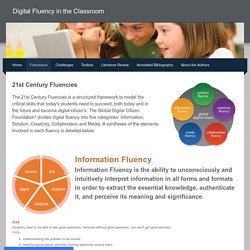
AcquireKnowing the “How and Where” you can access this information. How to Help Learners Build Solid Research Skills for Life – Wabisabi Learning. The following article is adapted from our upcoming book on future-focused learning.
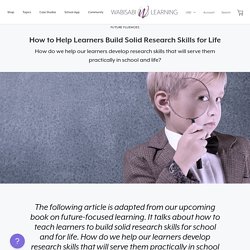
It talks about how to teach learners to build solid research skills for school and for life. How do we help our learners develop research skills that will serve them practically in school and life? Having this set of information location and management abilities in any digital-age survival kit applies equally to students, teachers, and everyday people. In the classroom, we teach it using the process of Information Fluency. We define this as the ability to unconsciously and intuitively interpret information in all forms and formats. 5 Steps to Build Solid Research Skills There are five distinct stages to Information Fluency, which we call the 5As: Ask—Asking involves fully understanding the problem being solved, identifying key words, and then forming questions around them.
The Ocean in Motion The Internet as we know it is a swelling ocean of information. Ask Acquire Analyze Apply Assess Is our problem solved?